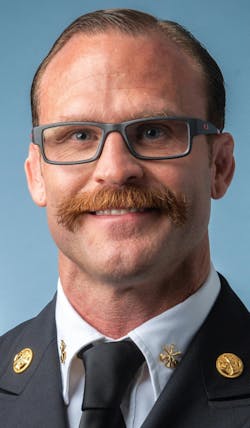Leadership Lessons: The Fire Department Assistant Chief's Influence on Crew Members
Key Takeaways
- Those who aspire to be a fire department assistant chief—and others—benefit from understanding the intricacies of the position.
- Fire department assistant chiefs must recognize that they have the opportunity to inspire others every day.
- The fire department assistant chief position is a lonely position and wears on a person mentally, but at the same time, it’s very rewarding.
In the October 2022 issue of Firehouse, my Leadership Lessons column was “What I Learned in 151 Days as an Assistant Chief.” Now that I’ve been in the position for more than three years (1,250 days to be exact, as of this writing), I wanted to share what I learned over that period of time, both good and bad, as I’ve been “marinating” as an assistant chief. My hope is to give a realistic viewpoint to those who aspire to be an assistant chief and to those who don’t aspire to that but might not understand what the job entails.
- You will make a difference in the lives of the department members if you think outside of the box and take initiative to do things differently.
- You will help to create a better department for the community with those with whom you serve.
- Our administration team, #TeamAwesome, is incredible. They’ve helped me learn so much.
- You have the opportunity to inspire your members every day.
- Mentor and coach your members every chance that you get.
- When your members call or text you, answer or call back in a timely manner.
- You will see the true colors of people, some good, some bad. Watch and learn.
- People will “tell” you who they are. Listen.
- Unfortunately, you will lose friends.
- Put the members before the paperwork.
- You can’t lead from within the four walls of your office. Go see your people.
- People are your currency. Without them, you have nothing.
- You’ll lose confidence; you’ll regain confidence; then, you’ll lose it again.
- People will make fun of you.
- People will think that you’re stupid.
- Some people really will appreciate the work that you do. Some could care less.
- Always treat everyone with respect whether they like you or not. I’d like them to be my friend, but if they aren’t, as long as they go home safely, that’s the job.
- Handwrite birthday cards and addresses on envelopes to all department members in every division.
- Wish your members a happy work anniversary with a simple text. It goes a long way. Further, encourage other leaders to do the same. People appreciate it.
- Be a team player. It isn’t about one division; it’s about the department. The same goes for the municipality.
- Members know who cares about the people and who only cares about the work.
- Be stern and direct but fair with everyone up and down the chain.
- Remain calm and be more reserved. This allows you to listen better and be more approachable.
- Look out for people to get them the help that they need personally or professionally.
- “Look out” for people. Not everyone wants you to succeed.
- “If this is the worst thing that happens to me all day, we’ll be just fine.”
- Learn how to do a shoulder shrug. That answers many questions and situations.
- Clean your work vehicle so that you represent the department well.
- Wear your uniform with pride and attention to detail. People notice.
- Challenge those who are above you to think differently. Real leaders appreciate that.
- Don’t be afraid to say something that must be said.
- Lead with humility.
- Pay attention to people’s responses to communications, whether text, phone call or email. When they only respond in a timely manner when it has to do with them, they’re telling you all that you need to know.
- Don’t be fake. It’s obvious.
- Be real. It also is obvious and appreciated. My department’s assistant chief of operations is the perfect example of being real. He always says, “Just keeping it real.” People believe in that and in him.
- Remember your discipline, principles, values and what makes you you. Who you are is important. What you do is important. What you stand for is important.
- People will try hard to hold you back.
- Laugh and move on.
- What people say about you says more about them than you.
- Find a mentor who you can count on.
- Mentor at least two others who can take your position. Mine are ready to take it.
- Don’t micromanage your team. It’s obvious and not a good look.
- Give your team expectations, and they will thrive.
- Develop your team with training, conversations and outings.
- Make sure that your team is doing well personally and professionally.
- Learn how to say, “No,” and stick to it. Have a backbone.
- Watch out when people ask you from out of the blue to get coffee or eat breakfast with just them. Let me give you a hint: It has nothing to do with you as a person. They just want something from you.
- When people go around you to try to get the answer that they want, don’t take it personally but remember it. The lesson will come in handy later.
- Pay close attention to how people treat you in the room and when you aren’t in the room.
- Support those above you but don’t be afraid to question them. They don’t have all of the answers, just as you don’t. However, someone must help them, too. They appreciate it.
- Your work can help to change the culture, direction, vision and mission of the department to create a safer community.
- Don’t lose your love for the profession. The assistant chief position is different, and it will beat you down mentally. It also is a very lonely position at times but so rewarding.
- Remember where you came from and keep driving the department forward.
- Get used to people thinking that you’re a them instead of an us. The funny thing is that I was an us long before 436 of our 472 members even worked at the department.
Now, I’m a them, to make it better for all of us. I didn’t just wake up in this position. Twenty-plus years and 10 positions later, including every rank in my department, people seem to forget that. Remind them.
- Go to the firehouses and visit with the crews. Have real and difficult conversations with them. That’s how relationships are built. They need it, and so do you.
- Don’t be afraid to call someone out who needs it. You should hope that they would do the same for you.
- Not everyone will buy into the new culture; for those who do, invest in them so that they can develop to lead the organization; for those who don’t, they made their choice. Don’t forget it.
- Learn how to have grace and give folks the benefit of the doubt.
- Uphold the mission, vision and values of the department. When someone doesn’t uphold them, do your job.
- Protect those who do what they are supposed to do. For those who don’t, hold them responsible for their actions. The lives of department members and citizens are at stake.
- Hold the line on history, traditions and important aspects of the department. If not, the department could lose its identity.
- Believe that your work matters, because it does.
- Every day is a job interview.
- Lead them. If not us, then who.
A journey
I know that’s a tremendous amount of information to digest. However, it’s a real look at my experience over the past three years. It’s been an exceptional learning experience, and I’m so thankful for every minute of it.
You might read some of what’s above as negative, but to me, it’s all positive. The past three years have taught me so much truth about people, situations and how to navigate both. I truly understand the point of marinating in positions to allow people to grow. You can’t rush the process.
For all of you young folks out there and even senior leaders who believe that you’re ready for the next step, take a breath and realize that your current step is teaching you so much if you just pay attention—to everything, to everyone and to every situation.
About the Author

Dr. David Griffin
Dr. David Griffin is the assistant chief of administration in Charleston, SC, and is a Firehouse Contributing Editor He was the operator of the first-due engine on June 18, 2007, when nine of his fellow firefighters perished. Griffin has come through the ranks in operations in every uniformed position, from firefighter to battalion chief and shift commander to his current position, during his 20-year career in Charleston. He has a bachelor's degree in education from The Citadel, a master's degree in executive fire service leadership, and a doctorate of education in organizational leadership and development. Griffin is the author of "In Honor of The Charleston 9: A Study of Change Following Tragedy," among three other books. He is an international speaker and instructor, a certified Chief Fire Officer and Chief Training Officer with The Center for Public Safety Excellence, an IFSAC/Pro Board-certified Fire Officer IV and a graduate of the Executive Fire Officer Program from the National Fire Academy. He is a graduate of Harvard University's Kennedy School of Executive Education program: Senior Executives in State and Local Government and of the Psychology of Leadership program at Cornell University's SC Johnson College of Business. Griffin is the owner of On A Mission, LLC, at drdavidgriffin.com.
